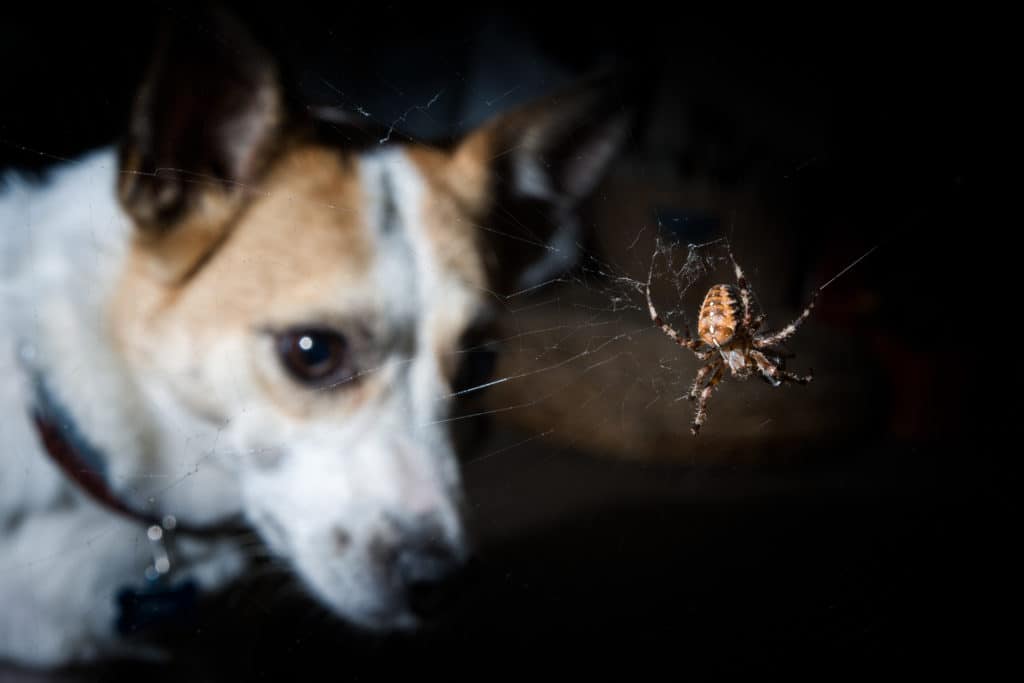Pets and Pest Control – Part 2
Pets and Pest Control – Part 2
Unfortunately, just as pest infestations affect us, they can affect our beloved pets as well, and in most cases where pests and pets interact, there are notable health risks to your furry friends. Luckily, with a bit of vigilance, you can either quickly treat, or avoid these concerns altogether.
In this blog, we discuss infestations of SPIDERS, BEES & WASPS, the various health risks they pose to your furry friends, and ways you can help avoid these pet-pest problems.
Spiders
While the two most common poisonous spiders in the United States are the black widow and brown recluse, we are lucky to only have the latter of these two spiders on the East Coast.
Brown recluse bites are, thankfully, rare due to their naturally weak pinchers that struggle to penetrate the skins of most mammals. However, with just a bit of counter pressure, these arachnids are able to puncture skin and easily inject their venom into the blood stream. These bites are very painful, but the pain is localized unlike the pain from some other spider bites. Initially, the wound develops into a blister before eventually splitting into a lesion and, in severe cases, can cause skin necrosis – destruction of the skin tissue. If one of these arachnids bite your pet, you will want to seek veterinary assistance immediately. Symptoms of a bite include:
- Mild redness at bite site
- A blister developing withing 2-8 hours of the bite
- A “bulls-eye” shaped lesion at the site
- Fever
- Lethargy
- Darkening tissue/tissue death
- Kidney abnormalities
- Clotting
Regardless of the severity of the symptoms, it is always wise to seek veterinary assistance immediately to help your pet avoid any excessive pain, damage to their health/wellbeing, or even death.

Bees/Wasps
Unfortunately, these flying little pests can look like a fun play-toy to curious kittens and rambunctious pups. As with humans, the reaction that an individual pet can have in response to being stung can vary from minor discomfort to a potentially fatal reaction. If you know your furry friend has been stung, it is important to monitor him or her very closely for any warning signs of an allergic reaction. These signs include:
- Swelling (particularly around the head or neck)
- Rash
- Watery eyes
- Weakness or collapsing
- Dizziness or disorientation
- Vomiting or diarrhea
- Seizures
- Respiratory Distress
If your pet shows signs of any of these reactions it is important to seek the advice of your veterinarian, and, in particularly serious cases, you may need to bring your pet to an emergency veterinary clinic as soon as possible. However, if your furry friend’s reaction appears minor, you can still seek advice from your veterinarian regarding how to soothe the site of the sting, reduce injury from scratching the area, and, in the case of bees, how to find and remove the stinger.

Prevention
If you find that your home has unwelcome venomous visitors, or your yard is swarming with stingers, it’s time to call in the professionals. Dealing with both arachnids and wasps can be dangerous and should only be handled by trained technicians with all of the proper tools and experience to treat these pests quickly and effectively. Call your Green Pest Services office today for information on how we can help keep you and your pets safe.

Citations
11 Bugs to Watch Out For If You Have Pets (2017) American Pest. Available at: https://www.americanpest.net/blog/post/11-bugs-to-watch-out-for-if-you-have-pets (Accessed: September 2020).
Barnette, C. DVM Spider Bites, VCA Hospitals. Available at: https://vcahospitals.com/know-your-pet/spider-bites (Accessed: September 2020).
Buzhardt, L. DVM First Aid for Insect Stings in Cats, VCA Hospitals. Available at: https://vcahospitals.com/know-your-pet/first-aid-for-insect-stings-in-cats (Accessed: September 2020).
Venomous Spiders (2018) Centers for Disease Control and Prevention. The National Institute for
Occupational Safety and Health. Available at: https://www.cdc.gov/niosh/topics/spiders/default.html (Accessed: April 2020).
Keep Pests Out of Your Holiday Gatherings
Keep Pests Out of Your Holiday Gatherings Keep Pests Out of Your Holiday Gatherings Summary: The holiday season is all about good food [...]
Cold Weather vs. Warm Weather Infestations: How Temperature Shapes Pest Activity
Cold Weather vs. Warm Weather Infestations: How Temperature Shapes Pest Activity Cold Weather vs. Warm Weather Infestations: How Temperature Shapes Pest Activity Summary: [...]
Garden Pests Do Not Hibernate Indoors – How They Attack Houseplants And What To Do
Garden Pests Do Not Hibernate Indoors – How They Attack Houseplants And What To Do Garden Pests Do Not Hibernate Indoors – How They Attack [...]
The Scariest Pests (And Why They Freak Us Out)
The Scariest Pests (And Why They Freak Us Out) The Scariest Pests (And Why They Freak Us Out) Summary: A practical, homeowner-friendly guide [...]
Favorite Foods of Rats and Mice
Favorite Foods of Rats and Mice Favorite Foods of Rats and Mice Summary: Rats and mice are surprisingly picky about what they eat—especially [...]
Where Do Spiders Like to Hide? A Locals’ Guide to Sneaky Spider Spots (and What to Do About Them)
Where Do Spiders Like to Hide? A Locals’ Guide to Sneaky Spider Spots (and What to Do About Them) Where Do Spiders Like to Hide? [...]

